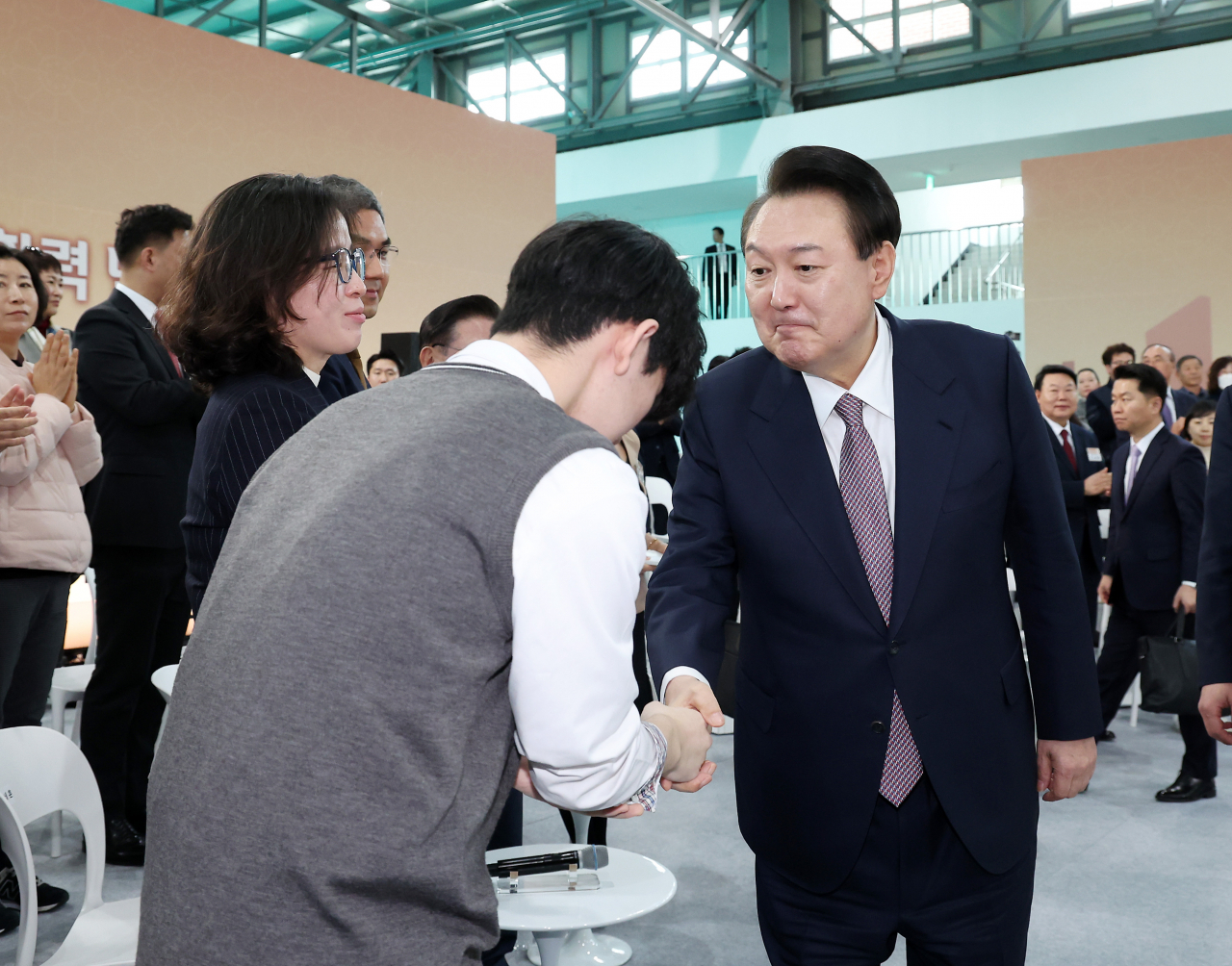Korea to lift land use restrictions near military bases
Yoon's popularity surpasses 40% mark for 1st time in 8 months on policy drives
By Son Ji-hyoungPublished : Feb. 26, 2024 - 15:14

President Yoon Suk Yeol on Monday pledged to remove restrictions near military bases regarding land use for private purposes such as construction, in yet another apparent move to appeal to voters ahead of the April parliamentary election.
Yoon's conservative administration has decided to ease land regulations on a total of 339 square kilometers of land across the nation -- equivalent to 47,480 soccer fields, or 0.3 percent of South Korea's land area -- mostly near military airfields and some along the border with North Korea.
Among them is 141 square kilometers of land surrounding the South Korean Air Force's Seosan Air Base in Seosan, South Chungcheong Province. The plan was announced during the 15th policy debate session held at the air base. Also, small lots of as large as 38 square kilometers along in border areas including in Cheorwon-gun, Gangwon Province and part of an elementary school construction site in Pyeongtaek, Gyeonggi Province are also included.
Over 8 percent of South Korea's land area is near military installations. and has been subject to regulations requiring consultation with the military before getting local government approval to get permission to develop it.
Yoon said the country must create an environment in which the military forces and citizens seek joint prosperity.
"The government has sought to go ahead with plans to carry out a large-scale lifting of military restrictions on lands, excluding critical zones for national security, to allow the land to serve as a cornerstone for the economic growth of the regions," Yoon said in his remarks.
It was part of Yoon's pledge Monday to transform South Chungcheong Province into a futuristic mobility hub to manufacture components for electric vehicles and hydrogen cars, as well as developing demand-responsive buses and drone logistics. Yoon said the new hub could generate 24.1 trillion won ($18.1 billion) of potential revenue and create some 81,000 jobs.
The announcement will lead to deregulation effective on the largest lots of land combined since the Protection Of Military Bases and Installations Act was introduced in 2007.
In 2018, the liberal former Moon Jae-in administration lifted restrictions on a total of 337 square kilometers of military-controlled land. The deregulation mostly took effect along the border with North Korea. This amount accounts for about half of the land cumulatively deregulated 2013-2022, or 662 square kilometers.
Over 8 percent of land across the country that is near military bases and installations has been subject to a two-tier regulation under the law. Dubbed either "controlled protection zones" or "restricted protection zones," any construction activities requires a "consultation" with the military before seeking a permit from an autonomous government in charge. For "controlled protection zones," however, new construction of a building is prohibited under any circumstances.
Monday's announcement will allow developers to seek the permit from the local authorities, without the military force's intervention.
"The concept of land under military control or restriction was introduced in the 1970s, and things have since changed a lot," Yoon said. "With urbanization and technological advancement, we have experienced a change in national security structure. ... The government decided to ease military restrictions on land in a way that would not affect our national security after contemplation."
During Yoon's term, the military control and restriction of 5.47 square kilometers of land was eased or lifted in December.
The National Museum of Modern and Contemporary Art's Seoul branch was built in 2013 on what was formerly the headquarters of the now-defunct Military Defense Security Command, with the land use restriction still in place on parts of the land. The military restriction was removed in 2023 so that the MMCA can use the land privately.
In line with the move, Yoon last week unveiled plans to ease regulations on greenfields protected by the government and permit land development projects in such conservation areas, locally dubbed "greenbelts."
Yoon said the regulatory criteria for the release of greenbelts will be eased, and local governments will be granted greater power to scrap the "greenbelt" designation of conservation areas and skirt regulations if these areas are to be transformed into new strategic industrial zones.
The sudden announcements of these pledges a little more than 40 days before the general election have driven up Yoon's popularity. On Monday, Yoon's approval rating came to 41 percent in the fourth week of February, topping the 40 percent mark for the first time in eight months, according to a poll by Realmeter.
According to the pollster, Yoon's back-to-back visits to provincial areas and pledges announced there, including "greenbelt deregulation, support for nuclear energy industry and industrial ecosystem normalization" have contributed to the popularity rebound.



















![[Today’s K-pop] Treasure to publish magazine for debut anniversary](http://res.heraldm.com/phpwas/restmb_idxmake.php?idx=642&simg=/content/image/2024/07/26/20240726050551_0.jpg&u=)